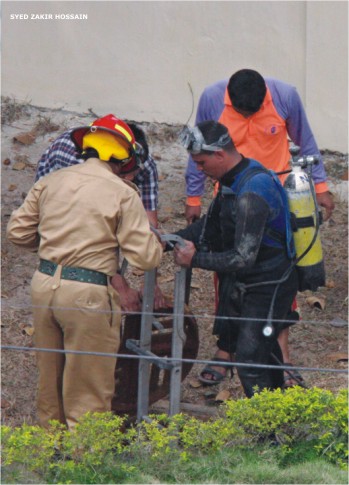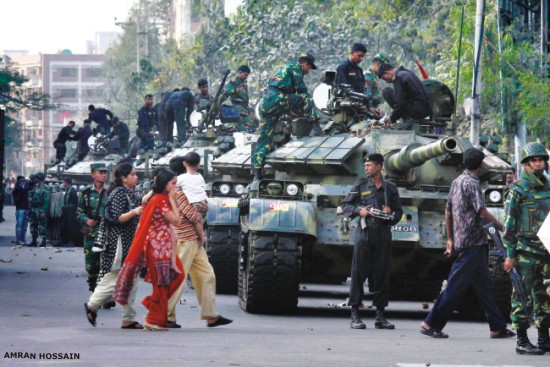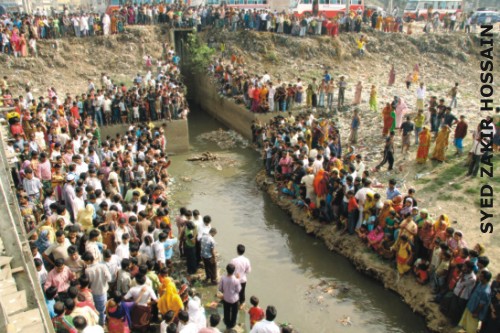
Inside
|
Picking Through the Wreckage
By the time this is published, nearly six weeks will have passed from the Pilkhana tragedy. This The din of blame games has drowned out the discussion over two crises -- one clear and present, another potential -- that are explored in this piece. We face a national security crisis. Our border is essentially undefended, and our army needs to replace scores of mid-level officers. Resolving this national security crisis would have been very difficult for any government. It is particularly difficult for a new government. How this crisis is resolved will determine whether a potential crisis, involving what Syeed Ahamed calls the argumentative oligarchs, eventuates. And if such a crisis does materialise, it may well put an end to our quest for political and economic freedom. The Dark Passage And yet, mysterious deaths in Pilkhana and elsewhere -- seven at the time of writing -- do absolutely nothing to improve the trust between officers and their men. Every such death makes it that much harder for the average BDR jawan to feel a sense of camaraderie with his officers. Indeed, every such death fuels an institutional antipathy amongst the BDR men towards their army brethren. The higher this death toll climbs, the less feasible it is to rebuild BDR. And yet, the current situation is clearly not sustainable. What we are faced with is the necessity to overhaul our border security and paramilitary forces, without tarnishing thousands of innocent BDR jawans who had nothing to do with this, men who shed their blood regularly defending our border. That is a huge task. That is the first part of the security crisis. And who gains from this crisis? Who gains if our border is undefended? It's not the Indian government. They have as much to lose from an unguarded border as we do, perhaps more than we do. An unsecured border will be used by smugglers of drugs, arms, and people. It will be used by violent jihadis, Naxalites, or separatists in the Indian north-east. They are the real beneficiaries of our crisis. Could they have plotted something? Perhaps. No atrocity was necessary plotted. Something along the line of an assassination-army attack-bloodbath would have achieved the desired end of a security breakdown. The first stage of such a plot came to pass, but the second stage did not because of decisions taken by the government and adhered to by the army. Unfortunately, the atrocities may have created the same effects that any putative plotters might have sought. And even if there were no conspiracy, extremists of various types or multi-national organised crime pose a threat to our national security as a result of this crisis. They are now connected. They can now move to and from the Indian north-east, or from Nepal to Burma, with impunity. Bangladesh has now become a dark passage. To complicate matters, the Burmese regime is already amassing troops in the border. Inter-connectivity is the latest euphemism to describe India's desire to use Bangladeshi territory to move people and goods to and from its north-eastern states, and Bangladesh's desire to move people and goods to and from countries like Nepal and China via Indian territory. Transshipment, transit, and corridor are other terms used to describe various combinations and permutations with respect to the above idea. Whatever term is used, the idea is viewed with scepticism by a large number of Bangladeshis, and no government -- civilian or military, of whatever persuasion -- has been bold enough to push for it openly. In an academic article presented at the National Defence College, Maj Gen Shakil, the assassinated BDR chief, argued that inter-connectivity of some form would be beneficial for Bangladesh. The tragic irony is that as a result of this tragedy, a form of inter-connectivity has been achieved, but one that yields no benefits whatsoever to Bangladesh.
As a result of the Pilkhana tragedy, our already porous border has become effectively open for shadowy forces operating outside the law. We have achieved a connectivity of sorts after all, just not the type Maj Gen Shakil talked about. End of an Affair? In Bangladesh, political power can be held only by three parties: the Awami League, the BNP, and the army ... BNP thought the bond between BNP and the army was a permanent one when in conflict with the AL. But events have shown that the army has gone beyond the old brotherhood and begun to form civilian professional alliances outside cantonment-inspired political parties like the BNP and JP only ... The sea-change, it seems, is the emergence of the Awami League as the party of choice, or at least co-existence, of the cantonment. For quite a while, it was obvious that the new army felt more comfortable with the younger-looking AL rather than the BNP manned by old stalwarts. So the sea-change of tri-partite politics is now fairly well established until new equations are needed ... The army party has now become part of the political equation directly, and, instead of being a force of coercion, it will be one of co-operation. It might have significantly reduced concerns about future military intervention.1 Mr Chowdhury titles his account of the events culminating in the December election "Happily Ever After?" If he were to write a sequel, perhaps he might have called it "End of an Affair," for the tragedy has at the very least strained the army-AL rapprochement. And there is a risk that the impacts would be far more severe. In addition to overhauling our border security, the army itself is undergoing major personnel changes. We have lost scores of trained officers. Replacing them would be difficult under any circumstances. Given our history, the task achieves special significance. Let's explore these security tasks through the prism of the violent 1970s. As Maj Gen Shakil noted in his last interview, aired posthumously, the BDR needs better equipment and training to do its job properly. These ought to be considered for any overhauled border security or paramilitary force. And yet, if any purchase of equipment for this force is not matched by another purchase of proportionate amount for the regular army, comparisons will be inevitably drawn with the supposedly "anti-army" first post-Liberation government. Such criticisms may well be unwarranted. But they will bite politically if there is any whiff of impropriety, whether it comes to defence procurement or the recruitment of jawans. Add to that the task of filling the officer vacancies. Meritocracy is typically honoured in the breach in our institutions. If there is any sense of this in the army promotions, it will mean an end to the army-AL affair. Concerned readers will be forgiven for worrying about a repeat of the 1970s, when mismanagement of the military was one of the reasons for the brutal halting of our quest for lasting political and economic freedom. A New Hope
Given the basic bread and butter issues, and the national security crisis that has been imposed on us, will the government have any resources -- time, money, people, or political capital -- for campaign promises, from a subway system in Dhaka, the war crimes trial, an end to extra-judicial killings, or digitising the country's governance? And yet, it is important to stress the ray of hope. Let us not lose sight of the fact that in the last week of February, a popularly elected government resolved the gravest crisis to hit the country in a quarter century. That government will have its accountability moment. There will have been by-elections by the time this is published. Dhaka City Council election will be in a few months. The opposition BNP is far stronger than its parliamentary strength suggests (it won 32% of votes in December, compared with 31% in February 1991). The people will have plenty of opportunity to judge the government's handling of the tragedy and its aftermath. As long as those opportunities are present, we should be able to overcome any crisis. Jyoti Rahman is a blogger (www.jrahman.wordpress.com) and a member of Drishtipat Writers' Collective. He can be contacted at dpwriters@drishtipat.org. 1. Forum, Jan 2009. |
 is hardly sufficient time for those who lost their loved ones to come to terms with their grief. Nor is it sufficient for apprehending and trying the perpetrators. But it has evidently been long enough for finger pointing and conspiracy theories, with much accusation being hurled by pundits of all persuasions against political opponents.
is hardly sufficient time for those who lost their loved ones to come to terms with their grief. Nor is it sufficient for apprehending and trying the perpetrators. But it has evidently been long enough for finger pointing and conspiracy theories, with much accusation being hurled by pundits of all persuasions against political opponents. 
